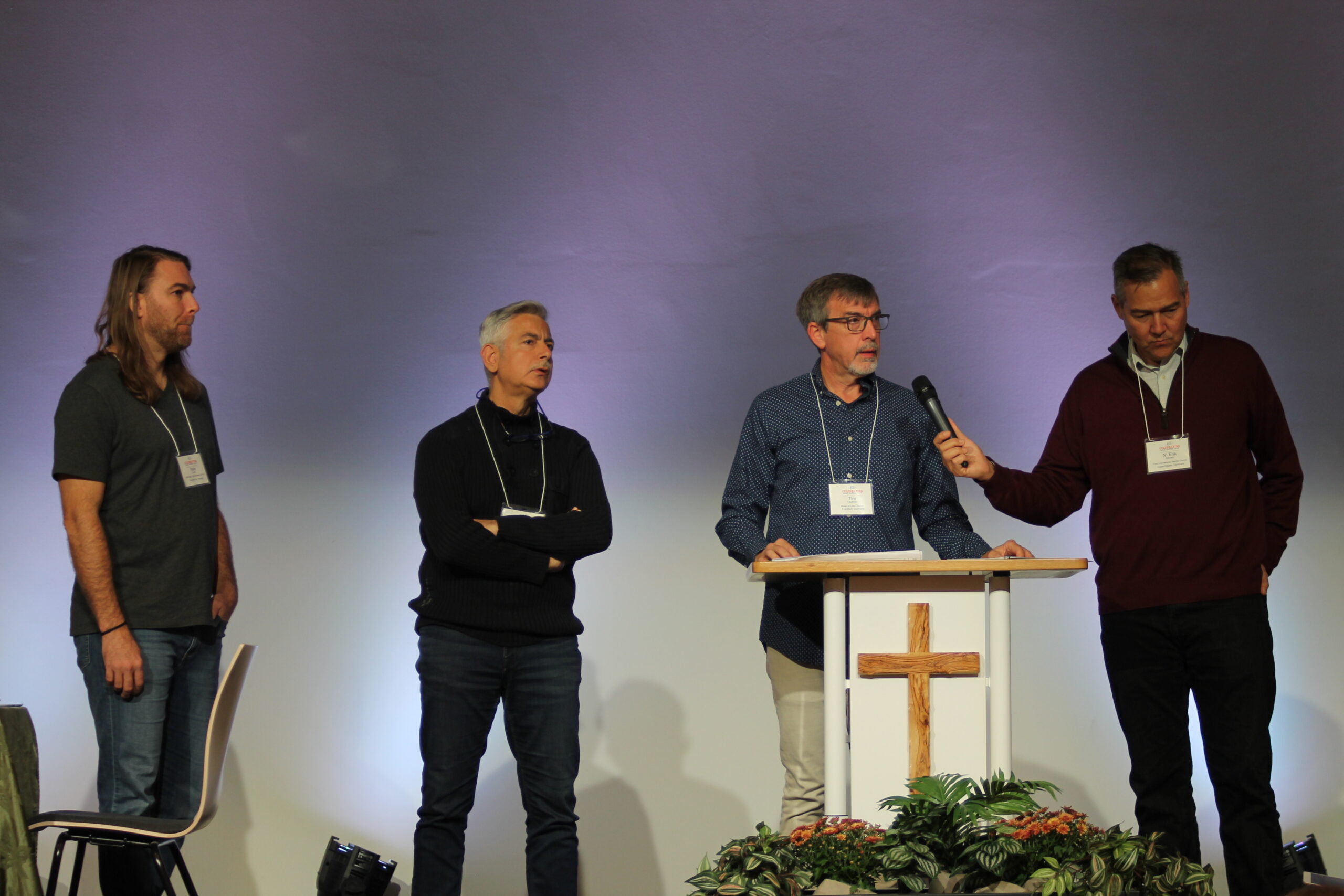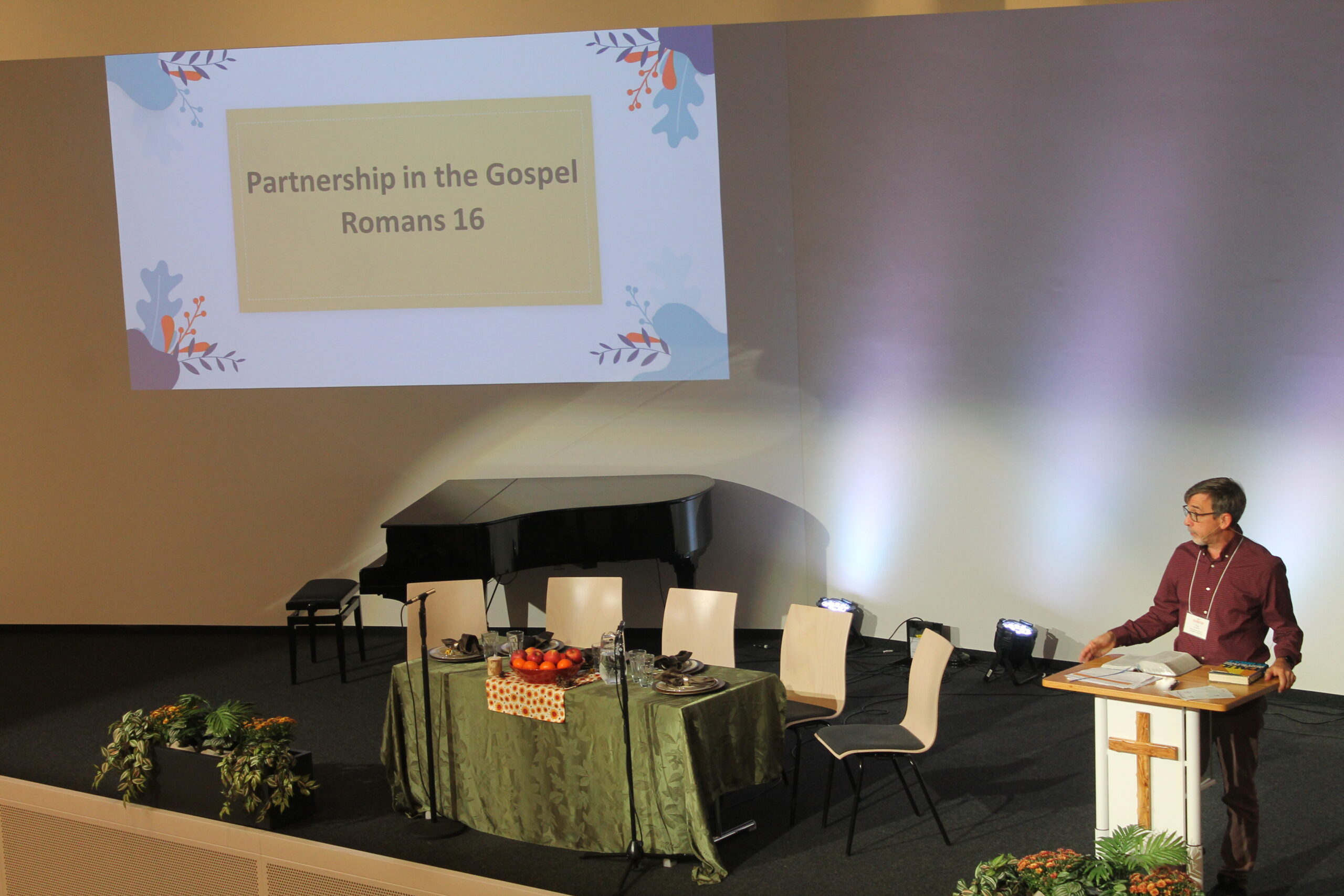
by Tim Faulkner
General Secretary
Celebrating the Past Year and Looking Towards the Next
Moses’ father-in-law replied, “What you are doing is not good. You and these people who come to you will only wear yourselves out. The work is too heavy for you; you cannot handle it alone. (Exodus 18:17-18)
Sometimes God’s work requires us to make a change. What we may not see is that if we fail to change, we actually become a hinderance to what God wants to do. In other words, God’s work passes through the transformation of God’s chosen servants and is affected through this process. Moses did not intentionally become ineffective. No one does. It happens inadvertently; we base our current behavior on our past experience and perspective. Then God graciously sends someone to tell us, “What you are doing is not good” and to propose an alternative.
As the IBC celebrates 65 years since the first churches were started in Wiesbaden and Frankfurt, we take time to consider God’s abundant faithfulness. Let’s make the most of this moment to reflect on the role that we play by acknowledging our limits, letting go of work that is too heavy for us, and letting God lead His people.
When I became the general secretary, I knew that change was coming, but it has taken three years to see it clearly. As I led us through a process of team building and focusing on mission-essential efforts, we have arrived at a period of increased clarity about the structure of our organization and our current priorities. Let me paint a picture of how we are keeping the local church at the center of the life of our Convention.
Reading back through the old Books of Reports, I have reflected on previous organizational discipline, team rules, and healthy lines of communication. As a result, I have created a provisional organizational chart that I am seeking, with the support of the messengers at the ACM, to implement this year. It is a simple chart but more clearly distinguishes governance from operations and also better identifies the people who report to the general secretary. I do not want to overcomplicate our structure, but I want to ensure that the IBC remains well-served by leadership that is accountable and increases engagement in teams. Like Moses, we are learning not to overlook the resources that God has placed in the IBC.
Alongside of the staff, the core strategy directors implement the ongoing policies of the IBC along with timely objectives and goals. Strengthening Churches and Multiplying Churches form what we call the “tip of the spear.” All other core strategies support these. The nominations committee and I have invested time and prayer in recruiting the best candidates possible for these two strategy directors. I am grateful for the qualified servants that God has provided to join in leading the IBC.
Beyond the governance and operations leadership of the IBC, I see many, many teams in the future. How will they function? Increasingly, we see teams organized around three shared values — humility, proactivity, and robust communication.
- I intend that we are listeners and learners. We are full of grace with one another as we strive to do our best for the Lord. Humility allows us to hear what we need to hear, without defensiveness and for the purpose of improving.
- This is a well-known word, but I am using it to avoid the Moses syndrome of “I can do it better alone.” We take initiative to engage and develop others so they can work with us.
- Robust communication. We don’t sit back and wait while making assumptions or getting frustrated. We seek clarification when our expectations remain unmet and strive to make information readily available to our teammates.
Behind communications is the actual work that we accomplish. In May, the Executive Leadership Team concluded 18 months of considering where among the many activities of the IBC we might find margin for change. I am continually impressed with the amount of work that we attempt to do between the staff and the ELT. We recognize that we lack the resources to add more commitments unless we can take some things away. Through an exercise called “fruit/function/form,” we examined what things are essential and what we could remove or reduce to find room for needed change.
This fruit/function/form exercise has helped us to ask honest questions. However, I believe that the greater question is one of engagement. When the churches and people of the IBC invest in activities, then we have a clear indicator that we should continue. Where there is no desire, or where there is no fruit, then like Moses we should be able to let go.
The general secretary role itself is changing as we become more effective at working with teams. I lead with vision and the organizational chart allows us to see the areas that I lead. Like Moses, I am learning to share responsibility. For example, there is work that we call “triage.” I am often the first responder. Together with the core strategy directors, the presidents and I prioritize and respond based on the urgency and importance of the situation. Many times, the staff is able to offer support. Sometimes we find churches and church leaders that are willing to serve each other. We will continue to move in this direction with more and more teams coming alongside us to serve our IBC family.
At least 50% of the weekends I travel with Jacki to visit churches. The face-to-face time is invaluable; we especially appreciate time with the pastor’s family. We have made it to visit almost every IBC church and should be able to do so by next year’s ACM. We also enjoy hosting pastors and their families in Frankfurt. The work of the churches is the reason why we exist, and we are grateful to be able to champion the mission and the family of churches that God has given us.
As we celebrate what matters most, we need to celebrate God’s people as they serve us:
- Kingdom partners in Baptist associations and ministries that serve our churches.
- Presidents Erik Nielsen, Roland Eskinazi, and Nate Korpi for grace, truth, and partnership in caring for precious IBC churches.
- CSDs Darryl Evetts, Brian Kirby and Dan Maxton, and Judith Lynn Maxwell for dedicating time, effort, and love to keep us moving towards the mission and vision that God has given to the IBC.
- Office staff Desiree Dyer, Judith Lynn Maxwell, and Herman Swart for working as unto the Lord, often taking on burdens and going beyond what is listed in their role descriptions in pursuit of excellence.
- Jacki whose constant friendship makes me a better person and whose Zoom calls have resulted in providential bonding as pastors’ wives meet and minister to one another.
- Ministry teams and team leaders Nick Gagnon, Jacki Faulkner, and Jeremy Woods for getting our teams back together and holding the first conferences since Covid-19. Thank you for your understanding as I have readjusted what the staff is able to offer and increased the burden on your teams!
- Thank you to innumerable pastors and leaders who have told me that although you are not looking for more to do, you would be willing to serve your Convention of churches! By God’s grace, this year we will engage you to receive your wisdom, assess our impact, and work better together to achieve the results that God has designed for us and deserves because of His great goodness to us!
The hero in our story is Jesus. God’s design for carrying out the work that Jesus has delegated to us is through the local church. When the church functions as it should, more and more disciples mature and make more and more disciples. Ultimately, God manifests Himself through His people, and society is impacted as lives are transformed by the saving grace of the knowledge of our Lord and Savior Jesus Christ and the empowerment of God’s indwelling Spirit.



